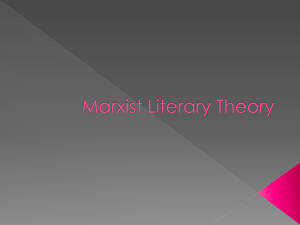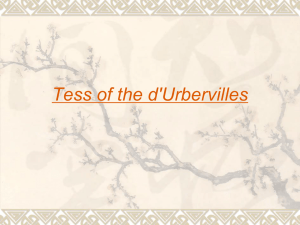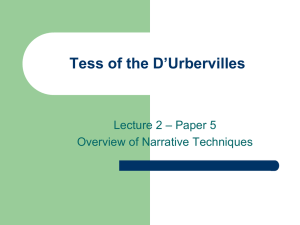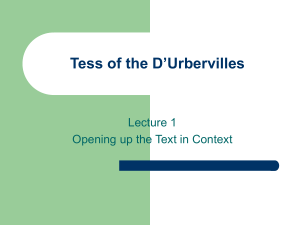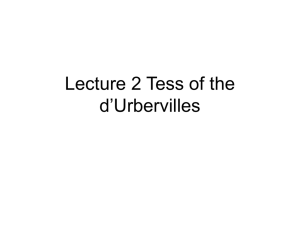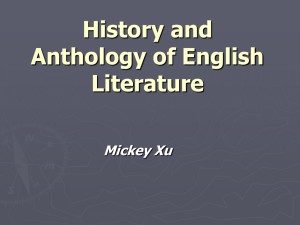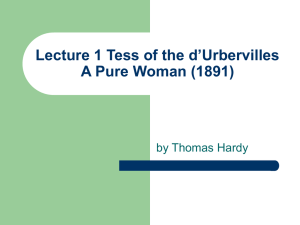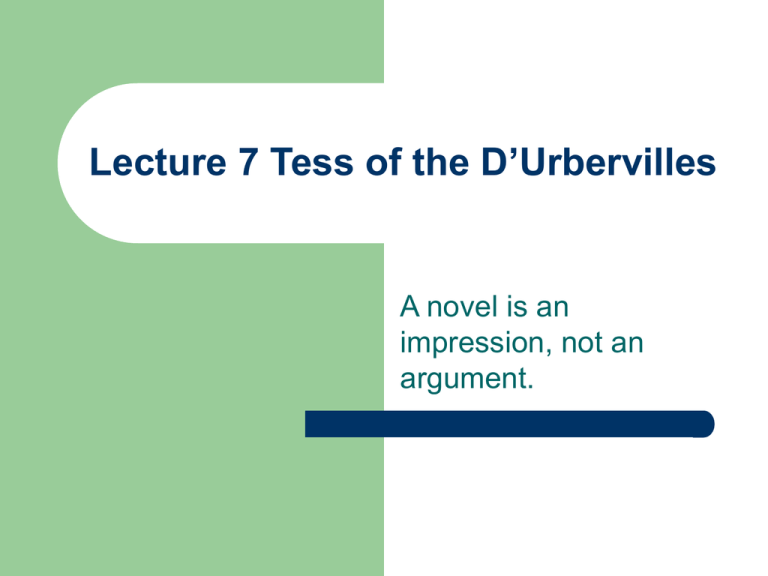
Lecture 7 Tess of the D’Urbervilles
A novel is an
impression, not an
argument.
Essay writing assignment 2
To what extent is Tess differentiated
from stereotypes of the feminine?
More on Hardy’s background
Hardy is a penetrating thinker; a philosopher
A sociologist;
a theorist of love relationships
And nature poet
Hardy continued to educate himself through his own
study—all of his life;
Started reading Shakespeare at 13 years old;
Hardy had no university degree.
Keep in mind
Writing convention of the Victorian novel
virtuous characters (such as Tess)
who are intended to engage the reader’s
sympathy
Should be represented as
‘speaking’ in standard English.
In dealing with Tess, given her peasant
background,
we get this explanation:
‘Mrs. Durbeyfield habitually spoke the dialect;
her daughter, who had passed the Sixth
Standard in the national school under a
London-trained mistress, spoke two
languages; the dialect at home, more or less;
ordinary English abroad and to persons of
quality.’
Focus of Lecture 7
Note some important clarifications
Structure and critical significance of length of
Phase the Third, The Rally
Characteristic Concerns and Issues
Representation of Tess as a Woman
Nodal Incidents (Seeing Connections)
Refer to last week’s GP Lecture on Gender
The Narrative Trajectory
The central drive of its plot; of its narrative
framework; of its narrative pattern?
Its narrative system or method?
Hardy’s large use of the accidental and the
coincidental drive the plot forward
The narrative system of the novel is the
system of its narrated episodes involving
A series of accidents and coincidents
Free enough but not totally free
Hardy recognizes a very strong element of
determinism in human existence
His characters are not fully free
But — they are free enough —
Free enough to recognize and make real,
significant choices (though not totally free)
Free enough to make mistakes, or to
struggle to make their lives whole and unified
Next: Structure and Length of Phase 3
The portion of the novel set in Talbothays is
noticeably quite long
We recall this is the part of the novel that
details the happiest time of Tess’s life
Designed this way for what intended effect?
So that the later very unpleasant ‘Phases’
have a much higher shock and tragic impact
When contrasted with Phase the Third
Characteristic central concerns
An attack on Victorian Christian moralism in relation to sexuality
The Victorian cult of chastity;
Hardy stresses repeatedly that Tess’s behaviour was in consort
with Nature
It is Victorian society that is out of sync with the world
The dominant class; and class conflict issues
The struggle for existence directed by an indifferent nature;
and human suffering and mortality
Heredity and Ancestral Destiny
The passing away of a way of life: from ‘field’ to ‘ville’
Characteristic Concerns
Religious belief and religious hypocrisy
Economic materialism; and economic repression
Economics of sexual relationships between classes
Pleasures of Country solitude; and outdoor life in
Nature vs. modern town life
Tradition (rural values) vs Technological Progress
(Farm hands vs Farm machines)
Value of Intellectual Liberty (as symbolized in Angel)
Throughout the novel Hardy suggests that
Tess is a part of Nature
And though society may judge her to have
“fallen”
Nature cannot.
She has been condemned
“under an arbitrary law of society which had
no foundation in Nature.”
Degeneration in Family Descent
Tess’s weakness, her dreaminess
Depicted in the journey to the market (Ch 4)
Also at Talbothays dairy when she she tells Dairyman Crick how “our souls can be made to go outside
our bodies when we are alive” (Chapter 18)
This dreamy unreality in Tess is not a mere odd
aspect of her character
It results from her heredity; it is even reflected in both
her parents
Ancestral Destiny (link to determinism)
Hardy appears to be at pains to emphasize
that among country folk
Degeneration of an old stock is common
And in Tess’s family line, (genealogical tree)
The stock is in decline
From the once “powerful”, “ancient and
knightly family of D’Urbervilles”
To the “heavily handicapped” Durbeyfields
Angel theorizes about
ancestral destiny
Angel tells Tess of the legend that some
D’Urberville of 16th / 17th century committed a
dreadful crime
Tess later learns that it concerned “a murder,
committed by one of the family, centuries
ago”
On their wedding night, Angel takes Tess to
one of her family’s dilapidated mansions
There she sees a portrait gallery of her ancestors
with treacherous narrow eyes and large teeth
Angel, after learning of her rape, charges
“decrepit families imply decrepit wills”
And accuses Tess of being
“the belated seedling of an effete aristocracy”
After learning that she killed Alec, Angel wonders
“what obscure strain in the < D’Urberville blood >
led to this aberration”
Representation of Tess as Woman
Tess is a woman whose life is centered around men
Hardy has been convicted of chauvinist manipulation
And omission
of Tess’s
< inner thoughts >
This is not < a feminist way > for a woman to be
It is argued, that Tess’s independence of mind on
matters of religion and sin occurs when she is not
engaged in a relationship with any man.
What do you think?
That once involved, her critical thought declines,
And she puts all her thought into the relationship.
Tess’s wasting of her
Loyalty to men also happens because of
The repressive gender ideal of her culture;
(Patriarchal Culture)
This disables Tess enough
to make her almost completely dependent on
these men for any sense of self.
She suffers from this dependency.
A primal value: ‘Stand by your Man’;
a woman’s loyalty to her man
Tess as a woman is endowed with great
capacities for not only centering her life on
men
But in the case of Angel,
of devoting her self to a man like Angel
It is possible to affirm that in women-men
relations, a woman’s loyalty to her man
Is one of life’s greatest (natural) gifts
It may then be argued
That Tess as a novel,
(‘Tess’)
Is powerfully suggesting that such a capacity
does exist
And even that it is a primal value in
womanhood;
in Nature
This no doubt offends contemporary Sexual /
Feminist perspectives and politics
Textual evidence
In the novel
Tess’s loyalty to Angel, including intellectual
loyalty, loyalty even to his ‘infidel’ beliefs
Is carried to such an extent that it becomes
Suffocating? Self-destructive?
Pathological?
Sickening?
Soul-destroying?
Moving on:
More about Phase the Third
Tess had never in her recent life been so
happy as she was now,
possibly never would be so happy again.
She was, for one thing, physically and
mentally suited among these new
surroundings.
[Chapter 20]
The landscape is one of fertility, of surplus, of
promises of animal and human contentment.
Tess’s growth:
Both intellectual and emotional
‘Almost at a leap Tess thus changed from simple girl
to complex woman. Symbols of reflectiveness
passed into her face, and a note of tragedy at times
into her voice. Her eyes grew larger and more
eloquent. She became what would have been called
a fine creature; her aspect was fair and arresting; her
soul that of a woman whom the turbulent
experiences of the last year or two had quite failed to
demoralize.’
The “germination” of a new springtime
“was almost audible in the buds; it moved her
as it moved the wild animals, and made her
passionate to go.”
Notice how Tess’s recovery is placed in the
context of animal life
Within the world of Nature
Tess and Angel
One may argue the love that develops between Tess
and Angel is sexual
The “Nature” in which it occurs is the combined
action of landscape, agriculture, inclusive of
farm animals, and weather
All these are symbolically suggestive of this…
‘What a fresh and virginal daughter of Nature…’
The overwhelming impetus of the Talbothays Dairy
section is towards the positive expression of
sexual desire as the natural and essential way
of being human.
This is not to deny their courtship is infused and
undermined by customs of sexual regulation and
control
But that they still had feelings that break free from
such constrictions and constructions
This experience creates a tension felt against the
Natural
The resistance to Nature creates frustration and
tension
Note Natural (Animal) Imagery;
*Potential for loss of personality
Tess is repeatedly compared to animals:
birds, cats, snakes, a leopard, a fly;
Tess is persistently engulfed by the
vegetation of the natural world she inhabits
*“a field man is a personality afield; a fieldwoman is a portion of the field; she has
somehow lost her own margin, imbibed the
essence of her surrounding, and assimilated
herself within it.”
[Chapter 14, Phase 2]
Angel - Tess
Angel’s doubts about marrying a woman who
is beneath him in class
His fearful self-control
All these provide a feeling of resistance
But all, except his self-control are swept
away finally
By the power of sex within Nature which
dominates this whole section of the novel

